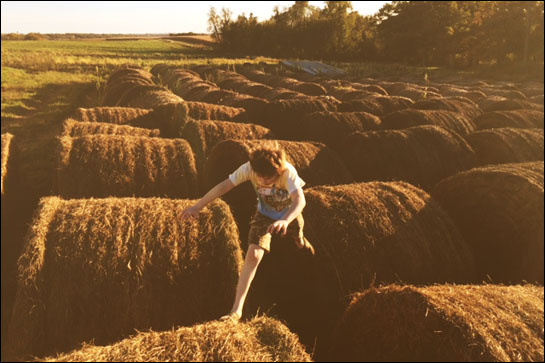How to get a career that provides stability

I spent a lot of the last decade writing about what each generation wants from a job. I wrote for Time magazine that Generation Y wants engagement. I wrote that Generation X wants flexibility. I wrote that Baby Boomers want power. But the common truth is that we all want stability. Each generation just has their own idea of the right path to a stable career.
A unifying thing about a multigenerational workforce is that career stability is the same for all of us—it’s about keeping us with the changing demands of work. Here’s what you need to do to create stability for yourself over the next ten years, no matter what generation you were born into.
Get great at improvisation.
Increasingly we are accustomed to output through computers. While some titles, like this one, are certainly not generated by a robot, Science magazine reports that most of us cannot tell the difference between sports news generated by a robot or by a person. Today 20 million twitter accounts are generated by robots, and it’s pretty safe to say you’re following some of them.
Jacob Bakkila spent a year imitating a robot on his twitter account. His followers loved the insane robotic tweets like Are you ready to have a swan? (re-tweeted 1000 times) and people were thrilled by the idea that he had made the content himself. Buzzfeed uses robots to find trending topics online, but the secret sauce of Buzzfeed’s immense appeal is that a human organizes the information, in a matter of minutes, into bite-sized nuggets that are easy to nibble. It’s that live improvisation between a human and technology that generates traffic.
The same is true with photos online. The best are authentic photos, happy improvisations between the subject and the snapper. Photos that get re-pinned on Pintrest are those with a conversational feel rather than staging, like my son up top, about to slip and fall between hay bales.
This is true in music as well. With YouTube we can see hundreds of excellent, planned performances from any artist under the sun. So in a sense the perfect performance is commodified and therefore, not nearly as interesting as it used to be. Instead the music that’s most exciting to hear live is improvisation. Pianist Helene Grimaud does this by not practicing her music so that both she and her audience are surprised by what comes out in concert. Francisco Vila did it by taking out his cello in an airplane and accompanying Maximillian, a beatboxer who was a few rows away.
If you google Francisco Vila, you won’t find his perfect performances up top. You’ll find he’s most famous for his three-minute airplane improv.
Feel comfortable going with your gut.
If you can teach a person to do the job then you can teach a robot to do the job. So the best jobs for people will be ones that have gray areas, jobs that require a non-scientific decision, based at least partially on human instinct.
This means we can all stop training school students to give right answers. Because right answers are available to everyone via Google. School is preparing people to fail in a world where all right answers are indexed. This is why suddenly we are not celebrating kids with Aspergers (“they are crazy geniuses”) but are putting them into special education (“they are, sadly, rigid black-and-white thinkers”). This is also why boys (who receive most of the C’s in school) end up making more money than girls (who are getting most of the A’s). And if you click on no other link in this post, click this one (warning: NSFW), where I got the quote about C’s and A’s.
Some people find they care most about having control over your time. In that case, you could work as a dental hygienist through this platform. Cloud Dentistry will let you set your own rates and pick which days you want to be off.
One of the best examples of a go-with-your-gut job is Melissa editing my photos. I send her thirty photos. She keeps one. She usually can’t tell me why she keeps this one and not another, and she has no written rules for cropping, but her finished photos always reveal something I didn’t see before.

Another example of a go-with-your gut job is the hardest to fill position at Rent the Runway. The company allows people to rent extremely expensive clothes instead of buying them. The company’s profit margins are dependent on being able to keep the clothes clean, and you can bet all these dresses are dry-clean only. So the company employs spotters. People who decide what the stain looks like (is that red from lipstick, blood, nail polish or berries?) and which chemical would the best thing to remove the stain.
This is not a job with right answers. Even after ten years on the job, you still are only making good guesses. Which is why Rent the Runway poached every spotter in NYC and then began training their own.
Another job based on instinct with a huge shortage of candidates: Food scientist. Who makes sure the new macaroni and cheese still looks orange enough when it’s cooked? Who do you call when your berry soda is green? And where is the hero who will finally find a satisfactory artificial flavoring for banana? The answer is a food scientist. Every consumer food producer hires these people, but no one wants to advertise their arsenal of food scientists, so you wouldn’t know there’s a shortage unless you talk to one. My friend the food scientist gets a recruiting call once a week.
Be creative, yes, but in moderation.
You’d think the world of ill-defined problems and gray-area answers would be great for the creative types. But in fact, it’s very scary to be highly creative. Cody Delistraty explains:
The most creative people are continually making associations between the external world and their internal experiences and memories. They cannot focus on one thing quite like the average person. Essentially, their stream of ideas is always running — the tap does not shut off — and, as a result, creative people show schizophrenic, borderline manic-depressive tendencies. Really, that’s no hyperbole. Fink found that this inability to suppress the precuneus [part of the brain] is seen most dominantly in two types of people: creatives and psychosis patients.
The idea of the crazy, starving artist is too overwhelming for today’s workers. People with a nonstop stream of new and exciting ideas are also people most likely to be depressed—to the point that creating is almost inextricable from suffering.
Unlike earlier generations that celebrated the crazy, mad artist, Generation Y are big fans of pharmaceuticals—sometimes with off-label benefits but always without chemical dependency. The pharmaceuticals tame creative spurts, but more importantly depression and inactivity are such painful places to live. Pharmaceuticals are the rescue squad.
99U suggests you package your creativity into one of four types of people: the survivor, the cross-trainer, the called, and the specialist. On the one hand, this strategy allows you to market yourself to people in a memorable, digestible way that makes you more likely to land a job. But more importantly, stepping back from your creativity so you can wrestle it onto a resume allows you to treat creativity like firecrackers you control with a match, rather than a roller coaster you ride on constant loop.
In this new world you can’t just show up for work —you have to actually give a part of yourself to the work to get it done. Which means that in-between jobs, you need to empty out your head, or refill your head, whichever feels right to you. An article in Art News surveys what painters do in-between canvases and it’s clear that each painter interviewed sees what they do during the gap as essential to their success. This is the time when you moderate your creative streak. You tone it down and you make sure, frankly, that you’re not a lunatic.
I sent Melissa a bunch of fall photos to edit. She said, “You have enough fall photos. You need to write something.”
“I can’t write. I am overwhelmed with the links I’ve saved to put into posts.”
“Did you save the one about how the Vikings were women? I’m sending it to you again.”
“Don’t tell me more links. My brain is suffocating in links. I need fall pictures.”
I convince Melissa the pictures are what I do to calm myself down when I’m not writing. “I need to look at something that’s not words,” I tell her.
And she sends me a gift.


This post is so incredibly useful.
Something that hit a chord:
1. What you do in between is as much part of the process as what you are actually working on. Somehow I was chewing on this idea but I couldn’t bring it full circle and the post did it for me.
[BARBARA EYELINER]
Oh, Suzy thank you, you’re so sweet.
[SUZY CHEESE]
Like sugar.
[BARBARA EYELINER]
It’s my new look. That’s why I’m here, I’m in a divorce. I’m divorcing
Ken, I caught him with my dirty little sister. It was a bad marriage right from the start. I’m like “I just want you to love me!”
and he’s like, “Just let me out of this closet!” Hah, I showed him.
[COOKIE SALAMI]
What, you locked Ken in the closet?
Penelope,
“I need to look at something that’s not words,” I tell her.
I think you look at the photos to find the words to write.
Great post –
Kathy
I agree with Melissa, I feel strongly kindred with Valkyries.
Most people can’t handle creative types in work situations.
“their stream of ideas is always running — the tap does not shut off — and, as a result, creative people show schizophrenic, borderline manic-depressive tendencies”
“each painter interviewed sees what they do during the gap as essential to their success. This is the time when you moderate your creative streak. You tone it down and you make sure, frankly, that you’re not a lunatic.”
My god, yes. The unmedicated brain of ‘creatives’ runs to the obsessive. Studies have shown that the successful ones are selective about what they choose to make. Essentially they have a good ‘off’ switch and focus their energy.
So, that’s Buzzfeed’s secret. In retrospect, I can see the hand of Ze Frank in a lot of the buzzfeed bloggery I enjoy; none more than yours, P.
“If you can teach a person to do the job then you can teach a robot to do the job. So the best jobs for people will be ones that have gray areas, jobs that require a non-scientific decision, based at least partially on human instinct.”
The world of software development is more and more tying together pre-written, abstract code someone else has already written. The fraction of new code in the average application is constantly decreasing. I’m encouraged that I know this about the industry and can take advantage of it, but it’s also disheartening to know just how much the frontier of computer automation has disappeared.
Everyone is saying that job openings in software development will continue to increase, but unless there is an artificial cap placed on the open-source movement, and how freely available, pre-written code continues to make privately hired development obsolete, I can’t help but already see the bubble bursting.
Yes, there is more and more open-source software available. This is a good thing. However, it can dramatically vary in quality. I make a living helping big companies know which open-source software to adopt. I need to be able to discern code quality, understand the community behind the code and use my experience and gut instinct to pick winners. I have never been busier. Like Penelope says, it is all about adapting to changing circumstances.
There is plenty of new code being written too, and a lot of it is in machine-learning.
I always wanted to be a great writer and never have thought I was good enough. (Like they say, “If you’re so smart why aren’t you rich?”)
Unfortunately I do have that thing where I’m absorbing, processing, thinking and spitting the words back all the time. I read in “Vogue” that Lena Dunham is the same. Also a control freak, just like the article says, also obsessive about the work. It must in the end be perfect. The words have to sing a certain way.
There are pluses here. I am excited and gratified when the day’s blog is done – that is the major focus for me. But on the downside, it’s upsetting to always be so very different, and frankly, misunderstood. Writer’s aren’t crazy. They’re just a different species.
The worst thing is, we don’t get to luxuriate in the knowledge that our skills will give us a job, in the end. Times have changed since F. Scott Fitzgerald was alive: Writers are a dime a dozen.
If you think about it, nobody is actually worth all that much on the job market, except as you said, the people with the most esoteric skills.
It’s surprising to me that we aren’t planning more actively for the jobless future. With so many people in this country starving, and an un-livable minimum wage, it appears to be upon us today.
Dannielle,
Last two paragraphs of your comment are so poignant, and I fear so true.
Many of the folks who will be jobless will just have no idea how they ended up there, and those with jobs will have a certain amount of smugness and relief that they have landed on the greener side of the fence. And will ironically be in jobs in industries that attempt to extract as much money as possible from those without.
I love anything and everything that is artificially flavored banana.
Fabulous picture up top, so dynamic. And it has inspired me…
So with all this talk of stability, tell us Penelope, did you marry The Farmer because no matter what you do, you know he will always bale you out?
(hehe, going to go with my gut instinct and put a lid on it now :-)
Great post, me and everyone at the office completely agree. Love the photo to makes a nice link.
It says that 10.75 million twitter accounts are fake and not 20 million in the Business Insider article.
But truth be told, it is probably closer to 20 million when you think of how many are replica accounts by the same user.
I think stability these days means have multiple sources of passive income and not being dependent on one’s job for the main source of income.
It seems like these days, people need to create their own jobs.
I like how you started with technology and then subjectivity but then emphasized on a more sarcastic, realistic view on creativity. How do you deal with writer’s block or how do you empty your mind to make room for fresh ideas?
Hmm.
Interesting. I will have to think about it a little. :)
Seriously, I’m always wondering if our civilisation isn’t actually going to kill itself with all that robotic social media stuff.
Social media generated by a robot? Sound like contradiction.
The only job stability a person will ever have isn’t the job itself, but the skills and knowledge that person gains over the years. Any company can go under at any point in time, but if you have a skill that is in demand, there will always be another company out there to hire you. Great post.
In regard to your article on Yahoo on how to answer the question: “What are your salary requirements?”, Most companies nowdays will not even consider someone for a position unless they have applied online first. Invariably, these websites are programmed to force the job seeker to enter a number in the “salary requirement” box or the application will not submit. This is no longer a fair face to face negotiation issue because the applicant is forced to give the first number before an interview is ever granted. How do you suggest getting around this obstacle?
Robot generated tweets, and re-tweets and followers even for them. That was hillarious. Some very interesting points. I think embracing creativity will be a great start for those seeking stable career paths.